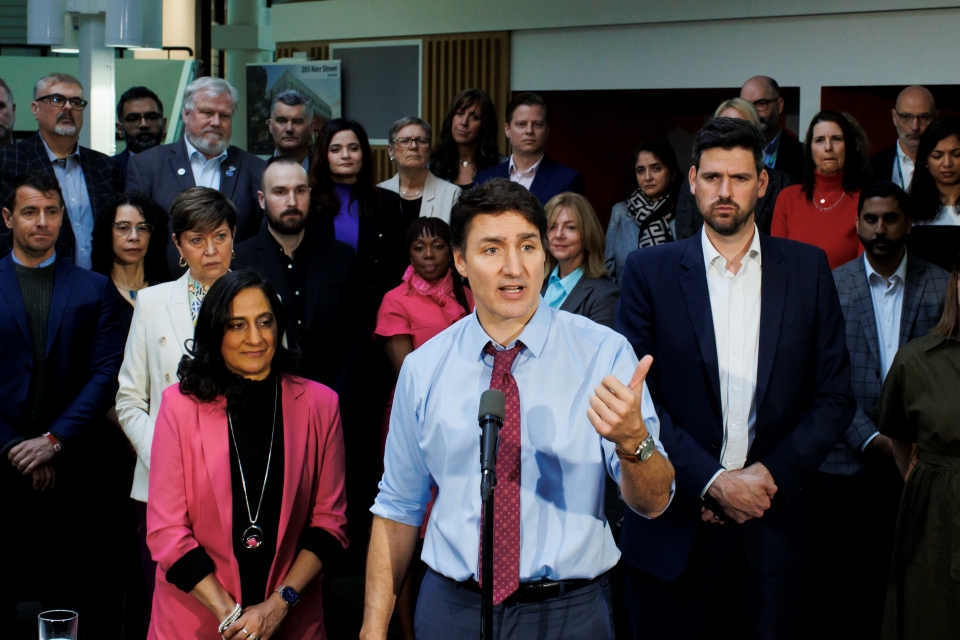The federal government has added 56 properties to a new public lands bank of locations that are suitable for long-term leases so developers can build housing, a move the Housing Minister says will help boost the supply of homes Canadians can afford.
Sean Fraser made the announcement Sunday in Halifax just ahead of a three-day cabinet retreat intended to prepare for the upcoming fall sitting of Parliament.
“Making public lands available for home construction is going to reduce the cost of construction and in turn reduce the cost of living,” Fraser said.
Former military bases, Canada Post sites and federal office buildings are among the properties currently included in the public lands bank, many of which were previously set aside for sale as they are no longer in use.

The new plan is to offer most of them for long-term lease rather than one-time sale to keep the lands in public hands and ensure housing built on them remains affordable.
The current list includes properties in 28 municipalities in seven provinces but will grow over time through an ongoing review of underused or vacant federal land and buildings.
Five properties — first identified in the April budget — are now moving into the development phase with the government asking developers for expressions of interest or requests for proposals.
Four of them are on former military bases in Calgary, Edmonton, Toronto and Ottawa, while the fifth is the site of a former National Film Board building in Montreal.
Conservative housing critic Scott Aitchison dismissed the latest plan as a repeat of something the Liberals have been promising to do since 2015. The Tories pointed out both the 2015 Liberal platform and the 2017 federal budget promised an inventory of public lands to make more properties available for affordable housing.
“It took nine years after he promised to build homes on federal land for Justin Trudeau to actually identify the few parcels of land he would build on,” Aitchison said.
In a video statement shared to social media, Prime Minister Justin Trudeau took a shot at Pierre Poillievre over the use of federal land, saying “the Conservative Party leader wants to sell it all off to make a quick buck. That does nothing for you.”
The Conservative housing plan involves the sale of 15 per cent of all federal buildings to be turned into homes.
Fraser said construction of housing on the first five properties could begin in the first half of 2025.
Housing will be a key issue at the cabinet retreat as Canadians continue to grapple with high costs and limited availability.
The annual end-of-summer cabinet session comes three weeks before Parliament returns for the fall sitting and is likely the last such event for this cabinet before the next election.
It may be the last real chance this government has to reset itself with voters before asking them for another mandate.
The next election has to be held by October 2025 but could happen any time before then. The cabinet will get an update on the status of Prime Minister Justin Trudeau’s supply and confidence agreement with NDP Leader Jagmeet Singh.
That deal has helped the Liberals survive all confidence votes since 2022 with the NDP’s help, in exchange for the Liberals implementing NDP priorities including dental care and the start of a national pharmacare program.
That deal is supposed to last until next spring but the NDP are under more pressure to walk away from it, particularly following the Liberal’s move last week to ask the Canada Industrial Relations Board to begin binding arbitration between the Teamsters union and the country’s two big national railway companies. Both Canadian National Railway (CN) and Canadian Pacific Kansas City (CPKC) locked out workers on Thursday at midnight amid stalled contract negotiations with thousands of employees represented by Teamsters. All freight trains and some commuter traffic came to a standstill during the ensuing work stoppage.
Trains are supposed to be returning to more normal schedules Monday but it will take time to restore normal service. The Teamsters union has also vowed to fight the decision in court, and president Paul Boucher said Sunday he was en route to Halifax with other labour leaders to “protest this decision at the Liberal caucus retreat.”
The dispute is the latest in a string of supply-chain and labour issues the Liberals have or continue to face, including at ports, railways and airlines.
Post-Covid-19 supply chain disruptions contributed heavily to high inflation that has also led to an affordability crunch in Canada and many places around the world.
Canada’s housing crisis — driven by high interest rates and rapid immigration that exceeds housing supply growth — has added to the affordability crisis with average home prices and rents rising sharply in the last five years.
Last year’s cabinet retreat in Charlottetown had a heavy focus on housing, but the Liberals left that session without anything concrete to announce. Their poll numbers continued to suffer as they failed to convince Canadians they have the recipe to fix a problem that has become critical under their watch.
They announced the broad strokes of their new housing plan in April, including new protections for tenants, loans to build more apartments and a spate of programs to massively expand the number of affordable units available.
Former Liberal chief of staff Marci Surkes, now the chief strategy officer at government relations firm Compass Rose, said housing will be central to this retreat and the Liberal agenda going forward.
“Frankly the government has certainly made significant policy moves and investments since last year and some of them are beginning to bear fruit, but the reality is that the focus on supply needs to remain in place,” she said. “There is no real relief yet.”
The government intends to spur construction of 3.87 million new housing units in the next seven years.
It’s estimated between 3.1 million and 3.5 million new units are needed by 2031.
This retreat is also expected to see the government discuss immigration and temporary foreign workers, industrial strategies including for the electric vehicle market, child care and Canada-U.S. relations.
The meetings start on Sunday evening with a working dinner and a discussion about global issues with Jake Sullivan, national security advisor to the U.S. government.
Two full days of meetings will follow. Monday will see cabinet hear from experts and advisers on housing, immigration and middle class economics. They will include Kevin Lee, CEO of the Canadian Home Builders’ Association, Sen. Hassan Yussuff, the former president of the Canadian Labour Congress, and Maya Roy, the former CEO of the YWCA Canada.
Tuesday’s discussions will shift to Canada-U.S. relations, with the upcoming presidential election holding major significance for Canada which relies heavily on U.S. trade for its economic stability. Canada’s U.S. Ambassador Kirsten Hillman will address the cabinet Tuesday, as will former ambassadors Frank McKenna and David MacNaughton.









